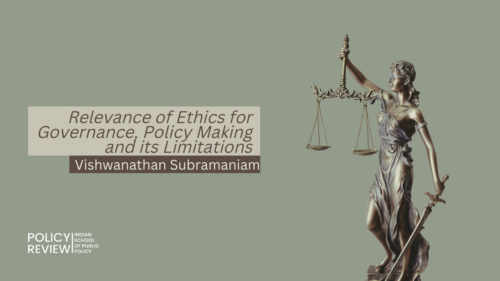
Relevance of Ethics for Governance, Policy Making and its Limitations

After graduating from law school, I worked with an advocate in the Delhi High Court on civil and criminal matters. Questions of my own morals and ethics first struck in a professional setting when we received a new allegation of money laundering against our client. I was tasked with conducting all the due diligence, analysing the complete legal notice, studying all relevant laws, and knowing the ins and outs of the client. At first, it was difficult to process, but as I dug deeper, I found facts and evidence that our client, most likely, had committed the alleged offences. Though our client, as the law states, should have a fair trial, as provided for under Articles 14 and 21 of the Indian constitution, the Code of Criminal Procedure and the Civil Procedure of Code of India, I was conflicted about what would constitute “fairness”. Should we argue or disclose information or confess before the court? To what extent? Each stance we could have taken, either sided with the client, or the law, or the courts, all of whom were piloting different agendas. At stake was either one man we knew in jail or a criminal free to do as he pleased, potentially causing more harm to society. Being the lowest rung of the office, my dilemma was set aside with directions from my senior on how to proceed. Over the next three months, we managed to get the allegation dismissed on a procedural technicality. Still, a close reading of the case file would reasonably prove that the scam had, in fact, been orchestrated by our client.
Questions on ethics in governance and public policy also stem from similar areas, where outcomes of actions are gauged as right or wrong, and their results are assessed by micro and macro stakeholders. Even the process of said actions is analysed in terms of impact. However, in comparison to ethics from an individual’s point of view, in governance and public policy, the scale of actions and the number of people that each of these actions influences, is significantly larger.
Looking at demonetisation in India back in 2016, while the government’s reasoning on economic grounds and black money may have been sound, the implementation was flawed, and due to the unfortunate lives lost in the struggle to obtain physical currency, both governance and public policy failed citizens of the country. This instance elucidates the complexity of the kind of problems that governments across the world seek to address and how far-reaching the consequences of governance and policy actions can be.
Education in India, thanks to the Sarva Shiksha Abhiyan introduced back in 2001, has made good progress over the past two decades. The policy measure helped establish the Right to Education Act and improved literacy, access to education and enrolment across the country. It laid the groundwork for the National Education Policy 2020, and we now see the continued results of good governance and public policy come together through ethical implementation. The stance of the government, despite changes in political parties, has stayed grounded in the goal of promoting education, and it adapted appropriately to accommodate changes in the world we live in and the needs of the people.
Ethics must override all external inclinations of those responsible for running our society. Following the recent release of the convicts in the Bilkis Bano gangrape case, Telangana Rashtravardhan Samithi (TRS) working president and Industries minister, KT Rama Rao, stated that “the release was unfortunate, condemned the Gujarat Government’s actions and appealed to Prime Minister Narendra Modi to take action on the matter.” This was a major breakthrough in India as setting political alliances aside and urging action to protect the victim’s life took importance over all other aspects. This helped propel the matter to the Supreme Court, where hopefully, the victim will get appropriate relief.
The money laundering case marked my first-hand experience with ethics, morals, rights and duties that we had studied Constitutional, Civil and Criminal law and also highlighted one of the key limitations. There may be times when there is no guarantee that an act is ethically correct or incorrect in its entirety. We may be stuck with the ethical dilemma but may also be forced to act, which could leave someone disadvantaged. However, as a student of law, and now policy, I have learnt that it is our duty to still proceed in the best possible manner as per our judgement, which must take all factors into account, and continue to adjust our actions based on how all stakeholders react.

